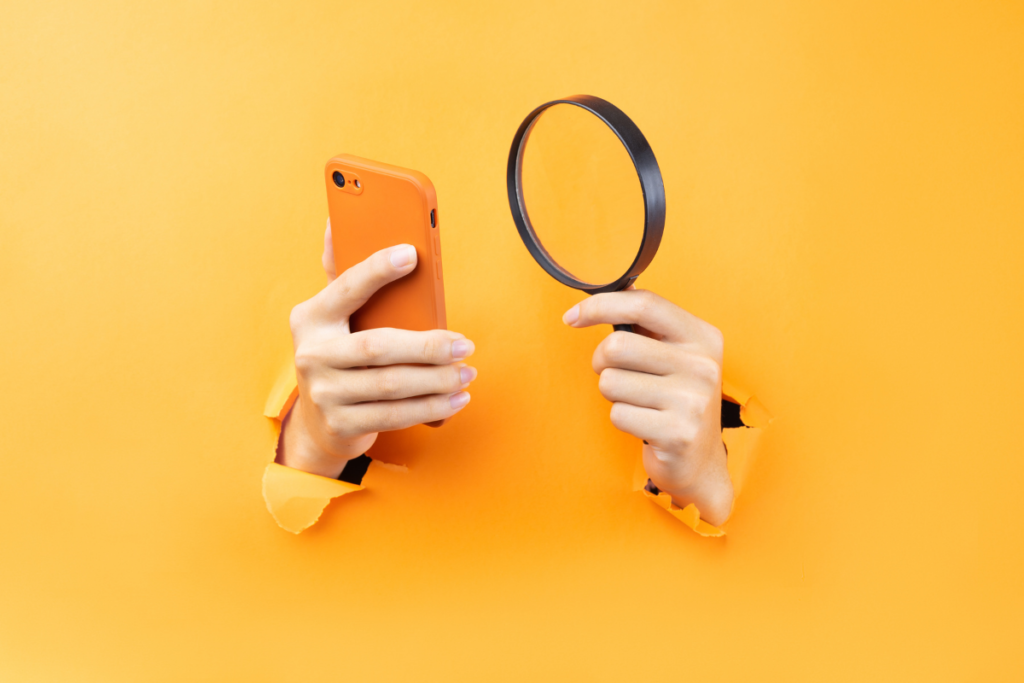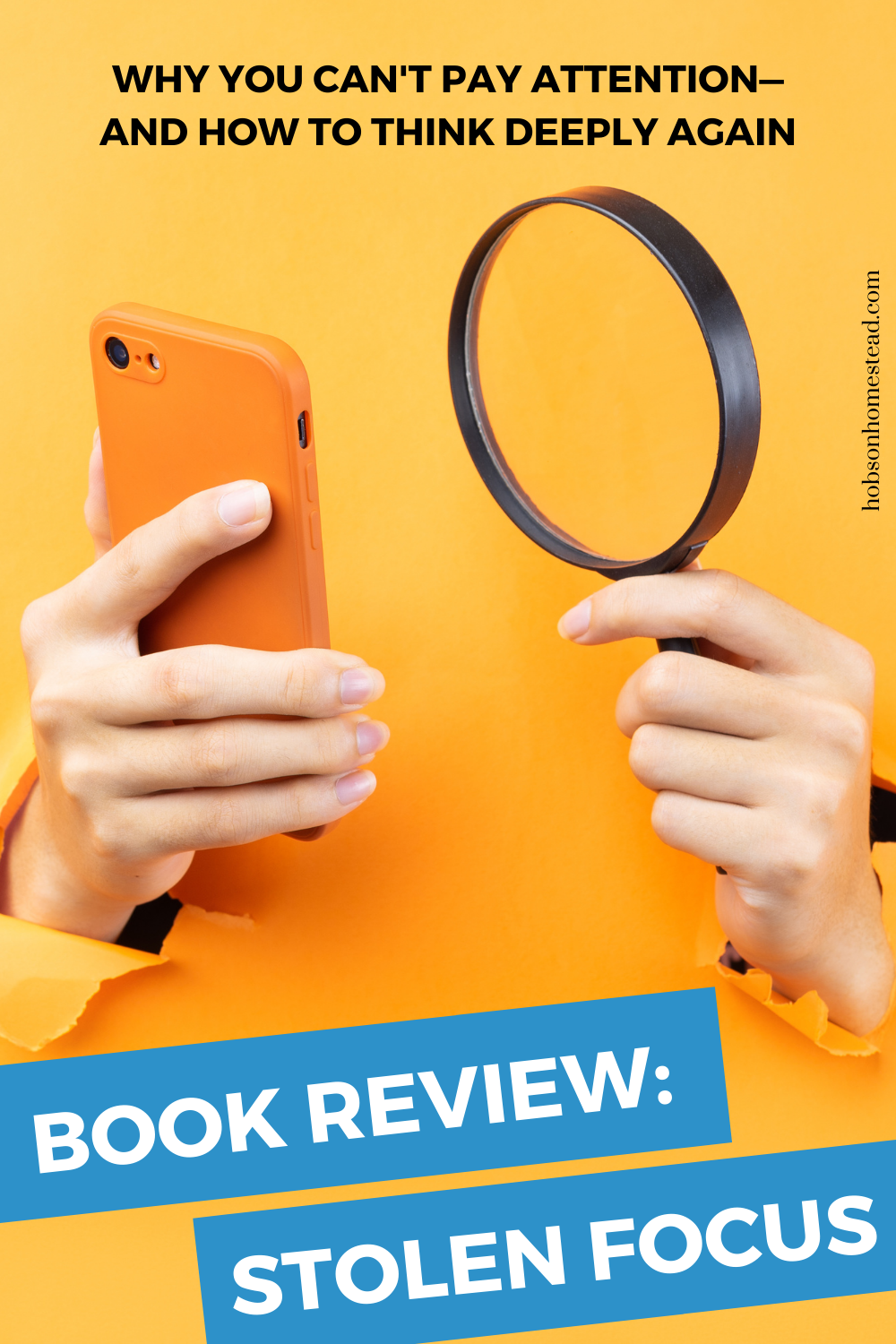While Stolen Focus accurately recounts the allure and distraction of technology and social media, it discounts any personal responsibility and points to big government as the answer. Check out this 2-star book review of Stolen Focus: Why You Can’t Pay Attention—and How to Think Deeply Again.
This month, I turn 40. The past few months have given me pause as I reflect on the fact that 40 often symbolizes the halfway point of life. I don’t feel old enough or wise enough or accomplished enough to be 40.
There is so much more I want to do in life—those unobtained and, sometimes, unrealized goals and dreams that we all preserve in the backs of our minds.

But before I truly think forward to the second half of my life, I must reflect on the first half. The good, the bad and everything in between.
What I came to realize is that, all too often, I’ve blown through my days in a daze. And as a mom of four, my past decade has been busy raising kids. Of course, that job is full of purpose. But I also realized that I was busying any downtime I had with social media.
Waiting to pick my kids up from practice? Scroll social media.
Waiting in car drop-off line? Scroll social media.
Waiting at a doctor’s appointment? Scroll social media.
Have a few free minutes during naptime? Scroll social media.
About a month ago, I became very convicted about my use of social media, specifically to what purpose I was using it. It’s not that I’m completely against social media, but I decided that:
I didn’t want to use social media to fill a void—without any purpose.
So I pulled back from social media (removing the Facebook app from my phone) until I could really gather my thoughts on it and how social media fit into my life’s purpose. Even today, I’m still working through this concept.
But as a result of this conviction, I began reading more and listening to some audiobooks in my spare time instead of scrolling social media. Stolen Focus: Why You Can’t Pay Attention–and How to Think Deeply Again and Digital Minimalism: Choosing a Focused Life in a Noisy World were two of those books.
And I must say, this approach has been wonderful. I feel like I’m continually learning, assessing, analyzing and rethinking. I don’t always agree 100% with what a writer has to say, but that’s the beauty of it: I’m using my brain to think critically and question others’ suggestions before accepting any changes for myself.
Stolen Focus, which debuted in January 2022, is trending right now and has become an Amazon Bestseller. So my husband and I jumped on the bandwagon and listened to the audio version of the book.
While we agree with the allure and distraction of new technologies and apps as outlined in the book, there are also many parts with which we disagree. And seeing as how my husband is very passionate about his opinions, he took it upon himself to pen a book review of Stolen Focus.
See if you agree with his 2 out of 5 stars rating. I certainly do.
Stolen Focus: Why You Can’t Pay Attention–and How to Think Deeply Again by Johann Hari
Review
Having coached college athletes and seen firsthand the damage inflicted upon young people’s attention by social media and technology, I agree wholeheartedly with the author Mr. Hari that we are in the middle of a human crisis even more pressing than Climate Change. My scholarship college athletes struggled to make it through a 90-minute practice without incessantly checking their phones. Many adult friends experience the same withdrawal.
The first half of Stolen Focus identifies all of the major psychological shifts that manifested with the increased popularity of phones and their apps. The author concludes that technology in general and social media apps specifically are built to steal our attention and keep us addicted to our phones. There can be no refuting this point. Any person alive in the the 20th century has experienced this phenomenon and felt the twinge of guilt for wasting several hours each day on pointless phone viewing. Youtube, TikTok, Twitter, Instagram, Facebook and Snapchat became billion-dollar companies precisely because they exploit a weakness in the human mind that craves the dopamine apps offer. Again, the first half of the book excels in its research and reaches scary but real conclusions about the danger of social media and similar apps.
The second half of Stolen Focus is where things start to disintegrate quickly as Mr. Hari offers solutions to the challenges he presented in the first section. He claims that because the problem with phone apps is systemic, literally built into the system, it cannot therefore be solved individually. At one point he clearly states that an individual cannot overcome addiction to phone apps, and compares the inability of humans to stop looking at apps to their inability to stick to a diet. He casually throws out the statistic that 95% of dieters gain their weight back within 5 years, concluding any and all attempts to resist phone apps will result in similar fashion.
The bad news, he says, is that we cannot take personal action and solve this problem. Well, what are we to do then since we are powerless slaves to Big Tech? His solution, which he defends vigorously for the remaining chapters, is for Big Government to regulate these corporations “for the common good,” to ultimately save us from ourselves. If only the government would put reasonable regulations on these companies, forcing Big Tech to limit their mind control over the ignorant and helpless masses! At this point Mr. Hari compares the obesity epidemic to the problem of psychological phone addiction. He claims the rise of obesity is caused by food companies flooding the market with cheap, sugary foods, rendering us powerless to resist in the exact same way software companies flood our phones with addicting apps. The solution to both problems is government agencies making healthy choices for us.
Here’s why government regulation won’t work and never did in the past for these problems. First, humans don’t need nor want government to tell them what to eat, watch, smoke or how to spend their time. Second, when we open the door for regulation, we give up control to a select few people who may or may not make decisions that we agree with. For instance, let’s say we accept food regulation and the FDA taxes all sugary foods and subsidizes all “healthy” food. Now a cupcake costs more than a bag of kale and, in theory, common people will buy less cakes and more vegetables. Except people won’t because carrots don’t release dopamine and sugar does. Broccoli isn’t addictive and people will still crave ice cream. Soda will go into the shopping cart like always, albeit at a higher price, deepening the hit to the family budget. Anyone who seriously believes raising prices on sugary foods will slow buying has no idea about the real world.
Caffeine is a highly addictive stimulant with the highest amount of addiction worldwide. Does Mr. Hari rant about regulating the destructive stimulant caffeine, slapping high taxes on evil corporations like Dunkin’ Donuts and Starbucks? Don’t be silly, of course not. Why? Because we want our coffee! We have the right to ingest what we want in the amount we want; it’s called freedom! Even if that freedom causes us migraine headaches and withdrawal symptoms whilst emptying our bank accounts on $6 sugary coffees. Ironically, Mr. Hari’s previous book was about the futility of the war of drugs, the exact thing he desires for apps. But society wants apps and they deserve access just like they deserve the option to play video games, eat sugar and smoke cigarettes.
Essentially, Mr. Hari blames the capitalist system. Myspace was the Facebook of 2002 until a better option came along and then, poof, Myspace was gone without pesky government regulation. Facebook’s engagement has plummeted in the US since 2019 because young people think Facebook is lame, and it will soon go the way of Myspace. That’s why Facebook pivoted its resources into the Metaverse. Instagram is slowly losing engagement as well with the shift of users to TikTok and Snapchat. In 10 years, all of these popular apps will disappear. It’s called capitalism and it works. People get bored and crave something new. What they don’t want is some guy in a suit choosing what is best for them.
And lastly, why does Mr. Hari reject the idea of personal responsibility? According to his book, it’s because he has personally failed with his attempts to throttle his lifestyle. He gained weight eating bad foods and blamed the food companies; he’s addicted to the dopamine of Twitter and blames the algorithm; he can’t focus and feels lonely without his phone and it’s Google’s fault. No, sir. Mr. Hari, put down your phone and live your life. Not everyone struggles with addiction the same way you do. And more importantly, leave others to make their choices.
What Mr. Hari lacks is self-discipline. Maybe he needs an app for that.

